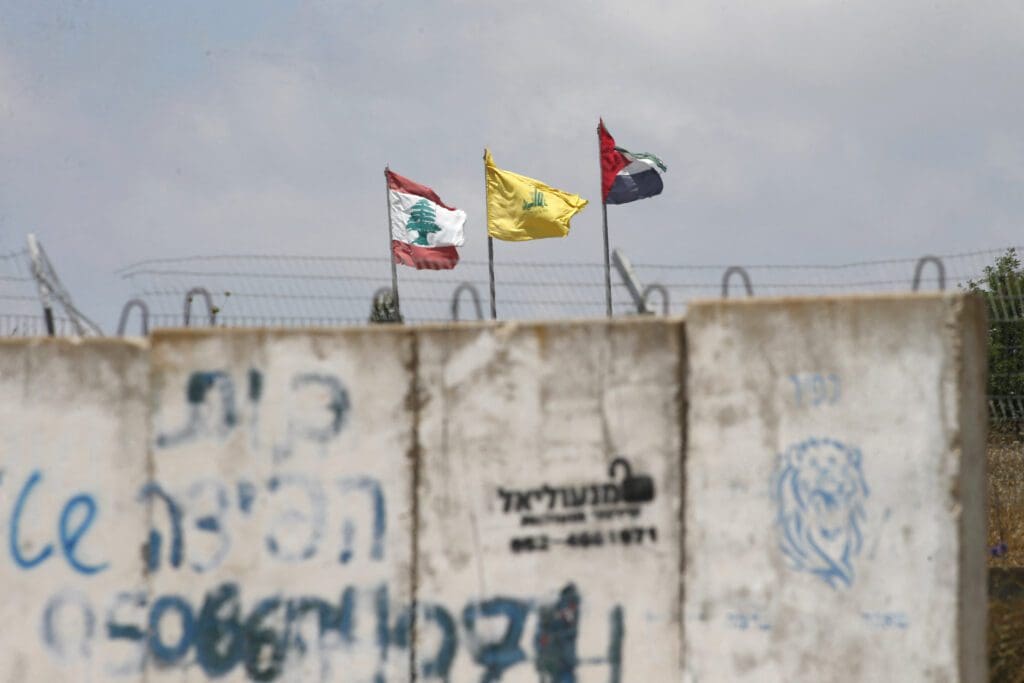Two weeks into the unfolding crisis in Palestine-Israel, and Lebanon is edging ever closer to the abyss of a war it cannot afford to fight. While there is a narrow, difficult path to avoid this outcome, options are dwindling with each passing day and the prospect of an escalation that consumes the region looms large.
Israel took an unprecedented blow on October 7, when Hamas operatives launched an attack from Gaza that killed over 1,300 Israelis, taking around 200 hostages and injuring many more. Israel’s national unity government, formed in the aftermath, has launched an unrelenting aerial bombardment of the besieged territory that has already killed thousands of Palestinian civilians. Now it is gearing up for a complicated and costly land invasion into Gaza aimed at eliminating—or at least severely curtailing—Hamas’ capabilities, infrastructure, and leadership.
The mounting death toll in Gaza puts Iran and Hezbollah under pressure to translate their material and verbal support for Hamas into a tangible response that nevertheless falls short of unleashing a regional conflict. The Iranian leadership’s statements have been mild, reflecting a clear effort to de-escalate the situation. Hezbollah chief Hassan Nasrallah’s fiery rhetoric has been absent from the airwaves, further hinting at an unwillingness to risk starting a regional war from Lebanon.
Although Hezbollah and Israel have engaged in a tit-for-tat launched on the Lebanese border, both sides have been keen to restrain themselves to their tacitly agreed rules of engagement. Initially, this meant that Hezbollah limited its attacks to the Israeli-occupied Shebaa farms, considered a target where an attack would not elicit a strong response from Israel. That tactic worked for two days, until Palestinian Islamic Jihad fighters operating from Lebanon launched several missiles from southern Lebanon into Israel, followed by an infiltration that led to deaths of Israeli soldiers. Israel responded and shelled several Hezbollah positions, resulting in the deaths of three Hezbollah fighters. Since then, the border has seen a slow escalation with some casualties but no massive missile barrages.
This behavior indicates that neither Hezbollah, Iran, nor Israel wants to expand the conflict. If this situation is maintained and the rules of engagement are followed, Lebanon could navigate the tensions of the moment and avoid a costly conflict.
Careful calibration
Still, the narrow path could lead off a cliff with one of three possible scenarios.
Firstly, the moment Iran decides that a new front is needed, Hezbollah might follow suit. Then it would only take a missile barrage or large infiltration attack to engulf Lebanon and Israel in another war that could spread to the whole region.
However, the relationship between Iran and Hezbollah is not a simple one-way flow of commands from Tehran to the movement’s Beirut stronghold of Dahieh (southern suburb of Beirut.) On the contrary, it is a two-way relationship where Hezbollah’s leaders have significant input in the decision-making process of the top Iranian leadership. Thus, changing the current de-escalation modus operandi would require the approval of Hezbollah.
Moreover, to ensure that neither Iran nor Hezbollah changes its mind, French, German and Turkish ministers have visited Beirut to reiterate the critical importance of preventing an escalation and to transmit a stern warning of grave consequences if Iran opens the Lebanese-Israeli front. Moreover, the United States has ordered two carrier strike groups to the Eastern Mediterranean in a show of force to deter Iran and its proxies from becoming active players in the current crisis.
The second scenario would stem from human error. War is not a precise science, and a Hezbollah or Israeli response intended to stay within the rules of engagement could veer and kill more than intended. The opposing party would be hard-pressed not to respond forcefully, and the situation could escalate into a full confrontation. Both parties have been carefully balancing their responses and taking the necessary precautions to avoid such a pitfall.
Thirdly, once Israel starts its ground invasion into Gaza, Palestinian casualties will mount further, and anger across the Arab and Muslim worlds will rise further still. Then it would become challenging for the different parties to restrain themselves and their supporters in order to avoid escalation on the Lebanon-Israel front. The scenario would be similar to October 17, when the bombing of a Gaza hospital killed hundreds of Palestinians and large demonstrations erupted all over the Middle East calling for retribution against Israel and its Western backers. Indeed, this third scenario is the most worrying, with few to zero mitigating factors.
None of this means that a full-scale regional war is inevitable. While the path to one will be more likely the longer the crisis goes on, there is little choice for Lebanon, its people and political elites but to try and avoid it. Already facing a deepening economic collapse, massive currency devaluation, migration crisis and security concerns, Lebanon cannot endure an all-out war between Hezbollah and Israel. But to do so, strenuous effort will be required of all the players in Lebanon, including the combined efforts of the Lebanese army, the UNIFIL peacekeeping force and the tacit agreement of Hezbollah, making sure that no third party can mistakenly unleash a war that no one wants.
So far, however, Lebanese politicians have fallen into familiar positions of pro-resistance and antiwar, and engaging in petty squabbles with their counterparts. There is no room for nuanced positions, and no politicians, even from the newly emerged civil society, appear to have had the courage to explain that it is possible to stand by the Palestinian people and their cause without supporting Hamas or Hezbollah.
Finally, Iran and the West would have to come to terms on shielding Lebanon from the war in Gaza, which is in the interests of both sides. Indeed, Iran can ill afford to lose its trump card, its elite Hezbollah force, at this time. Israel and the West, for their part, are also keen not to transform the Gaza issue into a regional, open-ended war.
However, the different parties are slowly running out of options. It will be politically difficult for Hezbollah and Iran not to increase their military involvement as more Palestinians die. Meanwhile, Israel has little option but to launch a ground invasion into Gaza to restore its army’s image, which will inevitably lead to even more bloodshed on all sides.
Once more, Lebanon might fall victim to its geography, history, and deadlocked political system. As the saying goes, when clouds gather in the Middle East, it rains in Lebanon. But the narrow path is still there, and all parties should do their utmost to stay on it.


